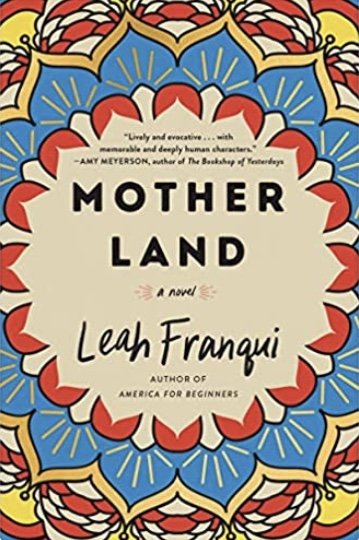Mother Land by Leah Franqui (HarperCollins)
When Rachel Meyer opens the door of her apartment, she expects to find the vegetable seller, bringing produce and a bout of linguistic frustration. Instead she sees her husband’s mother with a suitcase, waiting to enter and stay, and she knows disaster has arrived.
Newly married to a Kolkata man who has chosen to return to India, Rachel is a New York woman who’s thoroughly befuddled by Mumbai. Her Hindi phrasebook is almost useless because the people she interacts with speak Marathi. When she ventures out to buy food in the local market, she’s assailed with embarrassment and incompetence. When she goes out to explore the city, she’s faced with inexplicable chaos on every sidewalk. Her apartment is her only refuge and now that’s been invaded by a woman she barely knows, one who says she’s left her own home and intends to stay forever.
Floundering in a new country that baffles her, Rachel has ceded all decisions to her husband but this is too much. Suddenly the culture that’s thoroughly shocked her is in her bedroom, taking over, and her husband is acquiescent. After all, this is his mother and this is India. Blithely he takes off on an extended business trip, leaving Rachel with a problem that’s apparently her own.
Sometimes all that’s expected of a book is comfortable entertainment. Mother Land is the perfect antidote to winter’s darkness and the mind-boggling, apocalyptic speculative fiction of The Three-Body Problem trilogy. While it would be unfair to characterize the story of Rachel and her mother-in-law as chick lit; it’s definitely a warm-bath book, with a delightful twist at its end. Yet it’s more than that. It’s an insightful examination of culture shock in different forms--Rachel’s, her mother-in-law’s, and that of other Mumbai transplants with varying nationalities.
Leah Franqui knows her fictional territory. Her home is Mumbai where she, like Rachel, is married to a man from Kolkata. A self-proclaimed Puerto Rican-Jewish Philadelphia native and Yale graduate, she undoubtedly endured much of what Rachel suffers, but, as Franqui makes clear in her acknowledgments, without the intrusive mother-in-law. Her life in Mumbai gives depth and richness to Rachel’s, making this novel an illuminating, realistic, and occasionally satirical view of expat life in that city.
Rachel makes the classic rookie mistake by withdrawing from her new city and taking refuge in a world she can control, within her own apartment. Outside she spends “long afternoons, lost, aching with heat,” discovering that “the business she was trying to find had moved, or she had passed it twelve times, or that it had never existed at all.” “The crushing, bustling masses” and the cacophony of horns, bicycle bells, and cries from vendors that assail her on the streets lead her to conclude that New York “was a ghost town compared to Mumbai.” She stays home and amuses herself by cooking, until her privacy is invaded by the culture she’s hiding from.
As Rachel is forced out of her sanctuary, her tolerance for noise and crowds increases. At one of those ubiquitous gatherings of expat wives, the kind that lapses swiftly into criticisms of “them” as opposed to “us,” Rachel’s back goes up and her perspective takes on a new cast. Gradually she and her mother-in-law both begin to examine the concept of “home,” with startling results.
Anyone who has ever lived in another country, or who’s dreamed of doing that, needs to read Mother Land. While its setting is specific and stunningly descriptive, its stumbling blocks go beyond India’s boundaries. Entertaining? By all means, but it also provides a realistic guide to expat life anywhere in the world while presenting smart and seductive insights into one of the world’s great cities. ~Janet Brown
